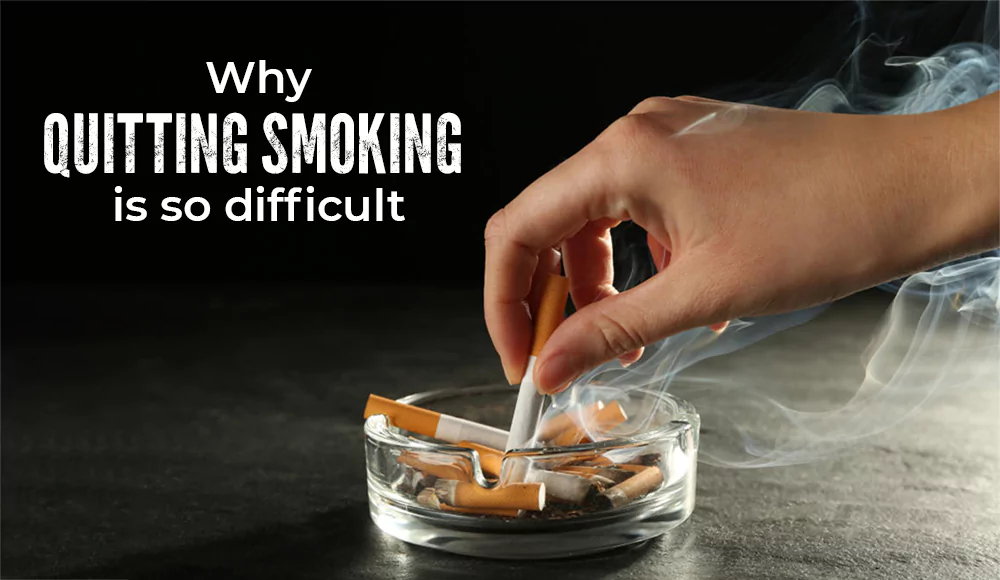
Why Quitting Smoking Is So Difficult?Many ex-smokers claim that quitting smoking was the hardest challenge they have ever faced. This includes individuals who have conquered mountains, climbed the corporate ladder, or experienced childbirth. It often takes multiple attempts to quit smoking completely.
Despite these difficulties, quitting smoking or tobacco consumption is undeniably beneficial. Just 20 minutes after quitting cigarettes, heart rates normalize. Within 12 hours, carbon monoxide levels in the blood return to normal and lung function begins to improve as soon as two weeks after quitting.
So, here in this blog post, we are going to talk about why people start smoking and why it is hard to stop. Let’s dig in.
Why Do People Start Smoking?
Most smokers began during their teenage years. Those with friends or parents who smoke are more likely to start smoking themselves. Some teenagers start out of curiosity or because they perceive it as “cool.”
The tobacco industry’s advertisements, discounts, and promotions heavily influence society. They spend billions annually to create ads portraying smoking as exciting, glamorous, and safe. Tobacco use is also depicted in video games, online, on TV, and in movies, which significantly impact young people. Studies show that teenagers who see smoking in movies are more likely to start smoking.
A newer factor influencing tobacco use is the popularity of e-cigarettes and other fashionable vaping devices. Often mistakenly considered harmless and more accessible than traditional tobacco products, these devices can teach new users how to inhale and develop a nicotine addiction, potentially leading to smoking.
Who is most likely to become addicted?
Anyone who starts using tobacco can become addicted to nicotine. Research indicates that smoking habits are most likely to form during the teenage years. The younger someone is when they start smoking, the more likely they are to become addicted.
The 2014 Surgeon General’s Report states that nearly 9 out of 10 adults who smoke began before age 18, and nearly all started by age 26. The report estimates that about 75% of high school smokers will continue smoking into adulthood, even if they plan to quit within a few years.
Is Smoking Really Addictive?
Addiction is characterized by the compulsive use of a substance despite its harmful effects and unwanted consequences. It involves a mental or emotional dependence on the substance.
Nicotine is the addictive component in tobacco. Regular use of tobacco products leads to addiction for many users. Nicotine, a naturally occurring drug in tobacco, is believed to be as addictive as heroin or cocaine.
How Effective is Nicotine Addiction?
Nicotine addiction is extremely powerful. Approximately two-thirds of smokers express a desire to quit, and around half attempt to quit each year, but only a few succeed without assistance. This is due to both physical and strong emotional (psychological) dependence on nicotine. Nicotine impacts behavior, mood, and emotions. For those who use tobacco to manage negative feelings and emotions, quitting can be particularly challenging. Smokers often associate smoking with social activities and various other daily activities, which adds to the difficulty of breaking the habit.
Quitting smoking may actually be more challenging than quitting cocaine or opiates like heroin. A 2012 review of 28 studies on addiction found that about 18% of people were able to quit drinking, over 40% were able to quit using opiates or cocaine, but only 8% succeeded in quitting smoking.
Many ex-smokers claim that quitting smoking was the hardest challenge they have ever faced. This includes individuals who have conquered mountains, climbed the corporate ladder, or experienced childbirth. It often takes multiple attempts to quit smoking completely.
Despite these difficulties, quitting smoking or tobacco consumption is undeniably beneficial. Just 20 minutes after quitting cigarettes, heart rates normalize. Within 12 hours, carbon monoxide levels in the blood return to normal and lung function begins to improve as soon as two weeks after quitting.
So, here in this blog post, we are going to talk about why people start smoking and why it is hard to stop. Let’s dig in.
Why Do People Start Smoking?
Most smokers began during their teenage years. Those with friends or parents who smoke are more likely to start smoking themselves. Some teenagers start out of curiosity or because they perceive it as “cool.”
The tobacco industry’s advertisements, discounts, and promotions heavily influence society. They spend billions annually to create ads portraying smoking as exciting, glamorous, and safe. Tobacco use is also depicted in video games, online, on TV, and in movies, which significantly impact young people. Studies show that teenagers who see smoking in movies are more likely to start smoking.
A newer factor influencing tobacco use is the popularity of e-cigarettes and other fashionable vaping devices. Often mistakenly considered harmless and more accessible than traditional tobacco products, these devices can teach new users how to inhale and develop a nicotine addiction, potentially leading to smoking.
Who is most likely to become addicted?
Anyone who starts using tobacco can become addicted to nicotine. Research indicates that smoking habits are most likely to form during the teenage years. The younger someone is when they start smoking, the more likely they are to become addicted.
The 2014 Surgeon General’s Report states that nearly 9 out of 10 adults who smoke began before age 18, and nearly all started by age 26. The report estimates that about 75% of high school smokers will continue smoking into adulthood, even if they plan to quit within a few years.
Is Smoking Really Addictive?
Addiction is characterized by the compulsive use of a substance despite its harmful effects and unwanted consequences. It involves a mental or emotional dependence on the substance.
Nicotine is the addictive component in tobacco. Regular use of tobacco products leads to addiction for many users. Nicotine, a naturally occurring drug in tobacco, is believed to be as addictive as heroin or cocaine.
How Effective is Nicotine Addiction?
Nicotine addiction is extremely powerful. Approximately two-thirds of smokers express a desire to quit, and around half attempt to quit each year, but only a few succeed without assistance. This is due to both physical and strong emotional (psychological) dependence on nicotine. Nicotine impacts behavior, mood, and emotions. For those who use tobacco to manage negative feelings and emotions, quitting can be particularly challenging. Smokers often associate smoking with social activities and various other daily activities, which adds to the difficulty of breaking the habit.
Quitting smoking may actually be more challenging than quitting cocaine or opiates like heroin. A 2012 review of 28 studies on addiction found that about 18% of people were able to quit drinking, over 40% were able to quit using opiates or cocaine, but only 8% succeeded in quitting smoking.
